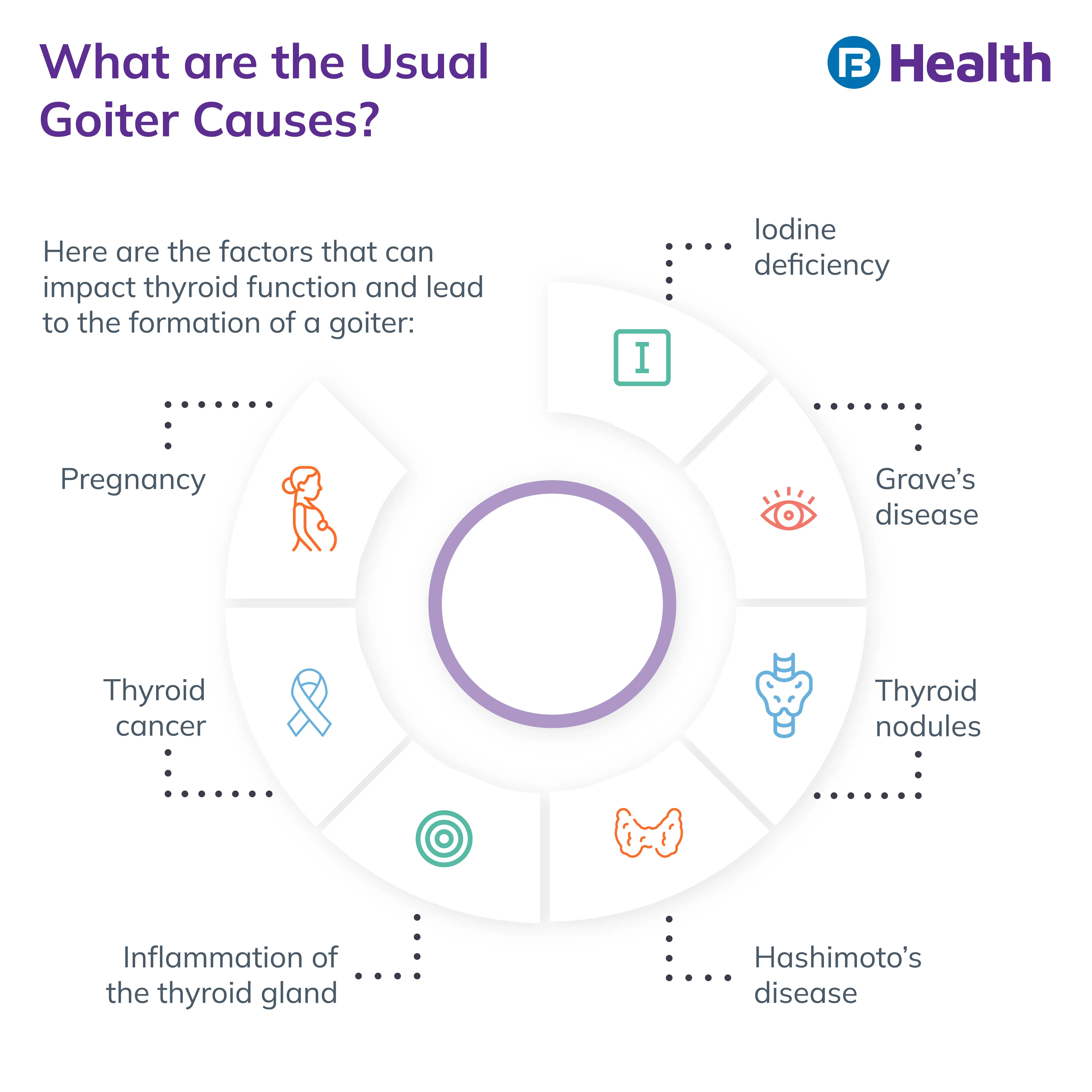Thyroid | 5 min read
Goiter: Causes, Symptoms,Types and Treatment
Medically reviewed by
Table of Content
Synopsis
An irregular growth in your thyroid gland, or goiter can be irritating or cause no symptoms at all. Read on to find out all about thyroid goiter symptoms, diagnosis, treatment, and more.
Key Takeaways
- Goiter is caused by an irregular growth in your thyroid gland
- Goiter causes can be related to hypothyroidism or hyperthyroidism
- Goiter symptoms include development of lumps and voice turning hoarse
Goiter is an irregular growth in your thyroid gland [1], where the whole thyroid may get enlarged or small thyroid nodules may form here and there. If you have a small goiter, there may not be any changes in your thyroid function. Larger goiters may boost or reduce the production of thyroid hormones like T3 and T4.
This change may affect the following:
- Body temperature
- Digestion
- Metabolism
- State of mental health
- Heartbeat
It may have links to conditions caused by irregular secretion of thyroid hormones like hypothyroidism and hyperthyroidism. The most common among goiter causes is lack of iodine intake. Treatment of the condition depends on thyroid goiter symptoms and causes. Read on to know more about goiter in the throat, causes, and symptoms.
What are the Types of Goiter?
The types of goiter have been classified differently depending on how the goiter grows and the levels of thyroid hormones in it. Take a look at the classifications.

Based on the Enlargement Pattern of the Thyroid Gland
Simple goiter also called diffuse goiter
This type of goiter is marked by the swelling of your entire thyroid gland.
Nodular goiter
This type of goiter is marked by the formation of a solid or fluid-filled lump inside your thyroid gland, called a nodule.
Multinodular goiter
This is similar to nodular goiter but with more number of nodules. Doctors identify these by looking at them or by conducting scans if they are too small.
Based on the Thyroid Hormone Levels
Toxic goiter
This type of goiter is marked by an enlarged thyroid gland and hyperthyroidism, or overproduction of thyroid hormones.
Non-toxic goiter
If your thyroid gland has become larger than normal, but the levels of thyroid hormones are normal, it indicates a non-toxic goiter.
Additional Read: Signs of Hyperthyroidism and Hypothyroidism
Thyroid Goiter Symptoms
As the size of the goiter in the throat varies from a tiny, unnoticeable nodule to a large, irritating lump, goiter symptoms differ too. While most times, a goiter doesn’t cause any agony, a goiter induced by thyroiditis can be painful.
Here are the common thyroid goiter symptoms:
- Development of one or multiple lumps in the front of your neck
- Voice turning hoarse
- Your throat area feels tight
- A feeling of dizziness on raising your arms above your head
- Inflammation in the vein of your neck
In the case of a goiter in the throat, you may also experience signs like breathlessness, wheezing, coughing, and difficulty swallowing. These goiter symptoms appear if the condition also squeezes your windpipe and esophagus. It can also accompany hyperthyroidism with symptoms such as rapid weight loss, increased heartbeat, shaking, diarrhea, agitation, and excessive sweating. If the underlying condition for goiter is hypothyroidism, the usual goiter symptoms may be rapid weight gain, constipation, tiredness, menstrual irregularities, and dry skin.
How to get a Goiter Diagnosed?
In most cases, doctors can diagnose a goiter by conducting a physical examination to feel your enlarged thyroid gland. Detecting a goiter in the throat is not always enough, so doctors may conduct a further examination to understand the issue that is affecting your thyroid. Here’s a look at the tests your doctor may recommend.
- Thyroid blood test: It measures the levels of thyroid hormones, which reflect whether your thyroid is functioning normally.
- Thyroid ultrasound: Here, doctors use sound waves to create an image of your thyroid gland and examine whether it has increased in size or some nodules have formed on it.
- Antibody test: It aims to find certain antibodies that are produced along with some forms of goiter.
- Biopsy: Here, the healthcare provider removes samples of tissue from your thyroid gland and sends them for a lab test to rule out cancer.
- CT scan or MRI: If the goiter becomes huge and affects your chest too, a CT scan or an MRI can help to measure the exact size and spread of the goiter.
- Thyroid uptake or scan: In this rarely prescribed imaging test, the healthcare provider injects a small amount of radioactive substance into one of your veins in the thyroid gland. By examining the image produced, doctors can study its size and function.
Goiter Treatment Procedures
Doctors decide on treatment of goiter based on multiple factors like how large it is as well as its causes and symptoms. Take a look at what they may recommend.
- Watchful waiting: If the goiter in the throat is tiny and not irritating and agonizing, doctors may not prescribe any particular treatment. They may ask you to come for regular follow-ups to keep the lump under check.
- Medications: If hypothyroidism is the prime cause of the formation of the goiter, doctors may prescribe levothyroxine. If the cause is hyperthyroidism, they may recommend taking propylthiouracil and methimazole. If the main cause is inflammation, they may ask you to consume a corticosteroid medication or aspirin.
- Surgery: You may need surgical intervention if the goiter in the throat has grown too large and is causing discomfort while breathing or swallowing. With surgery, doctors may remove your nodules or part or whole of the thyroid gland. Surgery becomes essential in the case of cancer. Based on what parts of the thyroid gland are operated on, you may have to take thyroid hormone replacement therapy for some time or the rest of your life.
- Radioactive iodine treatment: This procedure is recommended in some cases of hyperthyroidism-induced goiter in the throat. Here you have to consume radioactive iodine orally, which reduces the thyroid gland in size. However, after undergoing this treatment, you may have to take thyroid hormone replacement therapy on a regular basis.
Knowing all these facts about goiter in the throat makes it easier for you to manage the condition. To take the best care of your thyroid, it is important to know about thyroid hormone function, thyroid cancer symptoms, and the types of yoga for thyroid health. To get clarity on all these aspects, don’t hesitate to book an online doctor consultation on Bajaj Finserv Health. Clarify your doubts in no time, and take wise steps for a healthier life!
References
- https://www.researchgate.net/publication/233397527_Goitre_Causes_investigation_and_management
Disclaimer
Please note that this article is solely meant for informational purposes and Bajaj Finserv Health Limited (“BFHL”) does not shoulder any responsibility of the views/advice/information expressed/given by the writer/reviewer/originator. This article should not be considered as a substitute for any medical advice, diagnosis or treatment. Always consult with your trusted physician/qualified healthcare professional to evaluate your medical condition. The above article has been reviewed by a qualified doctor and BFHL is not responsible for any damages for any information or services provided by any third party.





